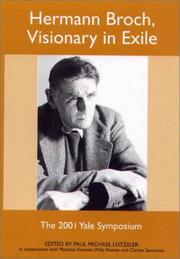| Listing 1 - 2 of 2 |
Sort by
|

ISBN: 1571132724 1571136312 9781571136312 9781571132727 Year: 2003 Publisher: Rochester, N.Y. Camden House
Abstract | Keywords | Export | Availability | Bookmark
 Loading...
Loading...Choose an application
- Reference Manager
- EndNote
- RefWorks (Direct export to RefWorks)
The Austrian novelist Hermann Broch ranks with Kafka and Musil among the three greatest 20th-century Austrian novelists and belongs to the century's most gifted novelists in German from whatever country. He established his reputation with 'The Sleepwalkers', a trilogy of political and philosophical novels. His best-known work is 'The Death of Virgil', a long, challenging work in a lyrical, exuberant, and sometimes nearly incomprehensible style, a kind of cerebral stream-of-consciousness of the dying Virgil. Broch also wrote extensively about modern art and architecture, Hofmannsthal, and mass psychology. He has a special connection to Yale, as he lived the last years of his life there after having escaped Austria in 1938. The participants in the Yale Symposium of April 2001 are among the world's most prominent Broch scholars. Fourteen of their presentations have been extensively revised for this volume, which focuses on Broch as critic and as novelist and dramatist. Topics include Broch's views on kitsch and art, and on drama; his cultural criticism; his cooperation with Borgese and Arendt; his theory of mass psychology; history in his works, Ernst Kretschmer's influence on him; 'Virgil' and Celan's 'Atemwende'; Jean Starr Untermeyer's translation of 'Virgil'; guilt and the fall in 'Those without Guilt'; and Broch reception in Japan. PAUL MICHAEL LüTZELER is Distinguished University Professor of German at Washington University St. Louis and editor of Broch's collected works. MATTHIAS KONZETT is associate professor of German at Yale; WILLY RIEMER is associate professor of German at the University of Delaware, and CHRISTA SAMMONS is curator of the German collections of the Beinecke Library at Yale.
Broch, Hermann --- Broch, Hermann, --- Criticism and interpretation. --- Brokh, Kherman, --- Brokh, German, --- Broh, Herman, --- ברוך, הרמן --- LITERARY CRITICISM / European / German. --- 20th-century Austrian writers. --- Austrian novelist. --- Broch reception. --- Hermann Broch. --- Mass psychology. --- The Death of Virgil. --- The Sleepwalkers.
Book
ISBN: 1787444651 1571135413 Year: 2019 Publisher: Rochester, New York : Camden House,
Abstract | Keywords | Export | Availability | Bookmark
 Loading...
Loading...Choose an application
- Reference Manager
- EndNote
- RefWorks (Direct export to RefWorks)
Hermann Broch (1886-1951) is best known for his two major modernist works, The Sleepwalkers (3 vols., 1930-1932) and The Death of Virgil (1945), which frame a lifetime of ethical, cultural, political, and social thought. A textile manufacturer by trade, Broch entered the literary scene late in life with an experimental view of the novel that strove towards totality and vividly depicted Europe's cultural disintegration. As fascism took over and Broch, a Viennese Jew, was forced into exile, his view of literature as transformative was challenged, but his commitment to presenting an ethical view of the crises of his time was unwavering. An important mentor and interlocutor for contemporaries such as Arendt and Canetti as well as a continued inspiration for contemporary authors, Broch wrote to better understand and shape the political and cultural conditions for a postfascist world. This volume covers the major literary works and constitutes the first comprehensive introduction in English to Broch's political, cultural, aesthetic, and philosophical writings.
Broch, Hermann, --- Criticism and interpretation. --- Brokh, Kherman, --- Brokh, German, --- Broh, Herman, --- ברוך, הרמן --- LITERARY CRITICISM / European / German. --- Austria. --- European Enlightenment. --- Hermann Broch. --- Sturm und Drang. --- The Death of Virgil. --- The Sleepwalkers. --- cultural thought. --- modernist literary works. --- political thought. --- postfascist world.
| Listing 1 - 2 of 2 |
Sort by
|

 Search
Search Feedback
Feedback About UniCat
About UniCat  Help
Help News
News